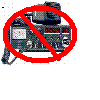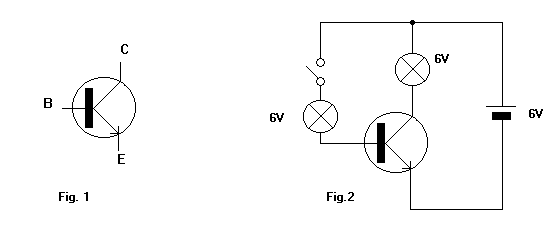| Author |
Message |
    
Shadowdrac
New member
Username: Shadowdrac
Post Number: 5
Registered: 11-2005
| | Posted on Saturday, February 09, 2008 - 12:59 pm: | 


|
I have a friend in need of tech advice. He has a competion amp and
needs to know the procedure for testing the transistors. It has 8 2879
pills on it. I know you have to remove the transistor to test it, but
kinda lost from there.
Thanks |
    
Patzerozero
Senior Member
Username: Patzerozero
Post Number: 4144
Registered: 7-2004

| | Posted on Saturday, February 09, 2008 - 3:48 pm: | 


|

Figure 1. With the meter set to measure ohms, clip one meter lead to the base connection of the transistor.
Touch the other lead first onto the collector lead and then onto the emitter lead.
The readings should both be the same, either both high resistance or both low resistance.
Now reverse the leads and repeat the procedure.
The results should be the opposite of those obtained before.
If they were both high before they should now be both low.
If they were both low before they should now both be high.
Now measure the resistance between emitter and collector.
It should read high resistance in both directions.
If you dont know the transistor connections consult a data book.
If you cant find the data then measure between the three connections in both directions.
You should now be able to identify the base connection and then decide if the transistor is OK.
Note that for this to work the internal battery of the meter must supply a voltage high enough to overcome the forward resistances of the transistors.
Many meter have a position marked with a diode symbol which must be selected when checking transistors or diodes.
Note that NPN transistors have low resistances where PNP have high, and vice versa.
Figure 2. shows a simple power transistor tester. With the switch open both lamps are off.
With the switch closed both lamps are on.
If different results are obtained the transistor is faulty.
The transistor shown is an NPN. Reverse the battery for PNP transistors.
a 2sc2879 is an NPN transistor. |
    
Shadowdrac
New member
Username: Shadowdrac
Post Number: 6
Registered: 11-2005
| | Posted on Saturday, February 09, 2008 - 10:38 pm: | 


|
Thanks Pat |
    
Static_killer77
New member
Username: Static_killer77
Post Number: 7
Registered: 10-2005
| | Posted on Friday, May 23, 2008 - 10:59 pm: | 


|
Pat; After checking all 8 transistors, as per your instructions, (I'm the friend, lol), I found only one to be defective. My question is, if the one is the only one bad, is it normal for the amp to only put out half the power it did before the transistor went bad? Ive been stumped about it since I found it bad, so any ideas and or help/advice would be greatly received. Thanks a ton, Static. |
    
Patzerozero
Senior Member
Username: Patzerozero
Post Number: 4250
Registered: 7-2004

| | Posted on Saturday, May 24, 2008 - 11:59 am: | 


|
an 8 pill box is either 2-4 pill boxes or 4-2 pill boxes joined together(in truth, 4 pill boxes are really just 2-2 pill boxes). far-fetched, but possible scenario....if excessive voltage(overdriven wattage) was the culprit, may have burned something in 1 of the combiner windings or connections, effectively cutting off 1/2 of the amplifiers pills from the other half. |
    
Johnhenre
Intermediate Member
Username: Johnhenre
Post Number: 103
Registered: 1-2004
| | Posted on Wednesday, May 28, 2008 - 6:24 pm: | 


|
Guy i'm going to tell you the easy way to test a 2290 1446 or a 2879 most what agree but try it it''ll not lie to you just set your ohm meter on 20k ohm's turn the pill up side down the # down hold the black lead on the cut tab on the pill go around each tab you should see around 2.44 more or less each will be within 10ohms more or less. if not its a dead duck and generally but not always the pill base resistor tell on the bad one, try a new one this way but i've never been able to see the same reading in the se called matched set they sell. v- beta or not. Bob |



